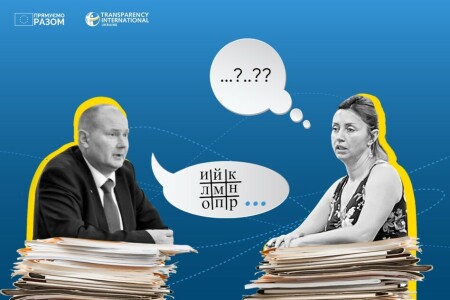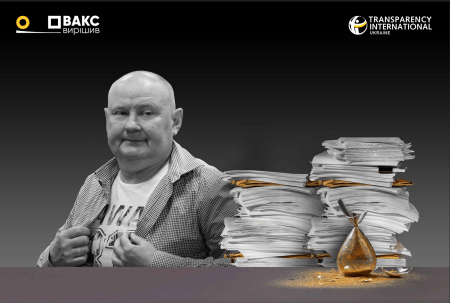The ruling of the HACC Appeals Chamber overturning the decision of HACC judges, which had partially closed the criminal proceedings against the defendants in the DACK case for participation in crimes committed by a criminal organization, went almost unnoticed. The partial closure had been based on amendments to Article 255 of the Criminal Code of Ukraine, which provides for liability for establishing or leading a criminal community or criminal organization, as well as participation in it.
In this ruling, the HACC Appeals Chamber also assessed other important issues that could further complicate an already lengthy trial in the so-called “DACK criminal organization” case. Let us look at the details.
What were the complaints about?
On 22 January 2024, a panel of HACC judges partially granted motions and closed proceedings against two defendants — Ihor Pohribnichenko and Volodymyr Keleberda — under Article 255(1) of the Criminal Code, specifically in the part concerning their participation in crimes committed by a criminal organization.
The judges only partially granted the motions. In other words, they did not fully close the proceedings, as the defendants had requested, with respect to both participation in a criminal organization and in crimes committed by such an organization (two distinct offenses that were criminalized before 27 June 2020). They closed the case only with regard to participation in crimes committed by the organization.
The court compared the old and new versions of Article 255 and concluded that participation in a criminal organization had not been decriminalized by the June 27, 2020 law, since the requirement regarding its purpose — committing serious and especially serious crimes (Article 28(4) of the Criminal Code) — remained unchanged. At the same time, the revised article removed the provision on “participation in crimes committed by such an organization,” meaning that this part of the offense was decriminalized.
However, the defendants appealed the ruling. They disagreed with the conclusion that only partial decriminalization had taken place and argued that they had sought full closure of the proceedings against them under Article 255(1).
They also claimed that the ruling had been delivered by an unlawfully composed court, since each judge had previously taken part in the case at the pre-trial stage. In addition, they pointed out that the motions were heard in the absence of one defendant, his lawyer, and the victims.
What did the HACC Appeals Chamber decide the first time?
The appeals were first heard on April 5, 2024. A panel of the Appeals Chamber consisting of judges Oleksandr Semennykov, Inna Kaluhina, and Dmytro Mykhailenko ruled to uphold the first instance decision without changes.
The panel agreed that the revised Article 255 indeed no longer contained the element of “participation in crimes committed by a criminal organization.” Therefore, one type of conduct had lost force, resulting in partial, not full, decriminalization.
The judges also stressed that the court was not obliged to obtain the defendants’ “consent” for partial closure of the case, since the Criminal Procedure Code does not allow closure of proceedings on conditional terms.
Regarding the alleged unlawful composition of the first instance court, the panel noted that neither the defendants nor their lawyers had filed motions to recuse those judges when the motions to close the case were being considered. And the previous decisions of the first instance, by which motions for recusal were either dismissed or left without consideration, cannot be appealed separately. Objections to such decisions may only be raised in an appeal against the main court ruling, as provided by Article 392 of the Criminal Procedure Code of Ukraine.
In addition, the panel of judges considers that a purely formal approach is insufficient to exclude a judge solely on the grounds of their participation in the proceedings at the pre-trial stage. Since the judges did not exercise judicial control, did not evaluate evidence, and did not influence the course of the case, there are no grounds to doubt their impartiality. Therefore, the panel found no grounds to doubt their impartiality.
Also, in the opinion of the HACC Appeals Chamber, the first instance court lawfully considered the motions to close the case with respect to certain participants without the participation of all, since the matter under consideration was a specific one.
What did the Supreme Court decide?
The parties disagreed with the Appeals Chamber’s ruling and appealed to the court of cassation. The Joint Chamber of the Supreme Court indeed identified certain procedural violations.
In particular, by reviewing audio recordings of hearings, the court established that conducting appeal hearings without one of the defense lawyers violated a defendant’s right to defense. The fact that the defendants, the prosecutor, and another defense lawyer did not object to holding the hearing without this lawyer is not decisive for the court, given the circumstances of the criminal proceedings. In addition, in the opinion of the judges of the cassation court, the HACC Appeals Chamber did not properly examine the defense’s arguments regarding the unlawful composition of the court.
In this connection, the Joint Chamber of the Supreme Court sent the case back for a new review by the appellate instance.
What did the Appeals Chamber decide during the repeated review?
The case was reconsidered by a panel of judges Serhii Bodnar, Mykola Hlotov, and Danyiila Chornenka. In its ruling of July 9, 2025, two of the judges (with Mykola Hlotov issuing a dissenting opinion) decided to overturn the first instance decision and return the motions for a new review by the HACC.
The panel pointed out that while the defendants had requested full closure of proceedings under Article 255(1), they had not consented to partial closure covering only participation in crimes committed by a criminal organization. Nevertheless, the first instance court partially closed the proceedings without the defendants’ consent, violating the Criminal Procedure Code.
The Appeals Chamber also stressed that not all defendants were present at the hearings. The absence of any of them violated the right to participate in the trial and constituted a significant procedural breach.
In addition, the panel found that the first instance court had failed to properly examine the defense’s claims regarding potential grounds for recusal of judges. The HACC Appeals Chamber agreed that there were no grounds for recusal of two judges on the panel, but reached a different conclusion regarding the third (Markiian Halabala) — “the ruling … may indicate that Investigating Judge PERSON_20 exercised judicial control in criminal proceedings No. 52019000000000522 of June 21, 2019, during the pre-trial investigation.”
Thus, in 2021, HACC judge Markiian Halabala, in this case, issued a ruling refusing to open proceedings to review an investigating judge’s ruling on newly discovered circumstances. The reason was that such a review is not provided for by law, which was also supported by the position of the Joint Chamber of the Supreme Court at the time. That decision did not address the substance of issues related to the pre-trial investigation; the judge merely stated the impossibility of considering the submitted motion. Therefore, he could not have formed his own opinion or position regarding this criminal proceeding that might serve as grounds for his recusal from the “DACK case.” This was also noted in the ruling of the judicial panel when the question of his recusal was raised.
However, the judges of the HACC Appeals Chamber concluded that this ruling may indicate that he exercised judicial control at the pre-trial stage in the “DACK case.”
What were the arguments in the dissenting opinion?
As it was mentioned earlier, Judge Mykola Hlotov issued a dissenting opinion, arguing that the appeals should have been dismissed.
He maintained that the Appeals Chamber had no authority at this stage to review the lawfulness of the first instance court’s composition. The subject of review was only the partial closure of proceedings, not a verdict, meaning recusal issues were not relevant. Since the CPC does not allow separate appeals against refusals to grant recusals, such issues could only be examined during an appeal of the final judgment. Filing an appeal specifically against the ruling on closure of the proceedings does not provide grounds for analyzing the composition of the court.
Even if there had been procedural violations in the court’s composition, Hlotov argued, they did not affect fairness, as the ruling in question concerned only a technical matter: whether an offense had been decriminalized.
Hlotov also considers that Judge Halabala’s participation in the panel does not violate the requirements of the CPC of Ukraine, since he was not involved in this criminal proceeding during the pre-trial investigation. In particular, the ruling refusing to open proceedings on the lawyer’s request concerned only the admissibility of the request, not the substance of the pre-trial investigation. And this does not constitute an exercise of judicial control within the meaning of the CPC.
Finally, Hlotov stressed that the motions for closure, filed by two defendants, concerned only their rights and did not affect other defendants. Therefore, the absence of some participants did not prevent the first instance court from considering the motions.
The judge also believes that by agreeing to the closure of proceedings under Article 255 of the Criminal Code, the defendants consented both to full and to partial closure. The CPC does not give them the right to demand that the court grant the motions only partially, since the proceedings are indivisible, and partial closure is merely the separation of a part. As they themselves filed such motions, the court has the authority to decide whether to grant them in full or in part, as even partial satisfaction corresponds to their intent.
***
To understand the context, recall that the so-called “DACK tapes” case has long been plagued by procedural hurdles and delays.
After being transferred to HACC in June 2022, the case only moved to trial in April 2024. By November of that year, proceedings had to restart due to a change in one of the judges. As a result, the case reached the evidence examination stage only in March 2025 — nearly three years after its transfer.
The Appeals Chamber’s latest ruling raises broader concerns about the formal and substantive management of court proceedings. In our HACC monitoring reports, we have highlighted the chronic problem of delays in large cases with multiple defendants. The CPC currently allows up to five defense lawyers per defendant, meaning that in a case with more than ten defendants, the defense may include over 50 people. If the participants do not act in good faith, ensuring a trial within a reasonable timeframe becomes a major challenge.
The presiding judge does have special powers to manage proceedings, as provided, for example, in Article 321 of the Criminal Procedure Code. In situations of uncertainty, the principles of criminal procedure apply, one of which is the requirement of reasonable time.
The hope now is that such decisions by the Appeals Chamber will not undermine the requirement of reasonable timeframes in the DACK case — and that lawmakers will soon introduce tools to effectively counter procedural abuses.
This material is prepared by the Transparency International Ukraine team





.png)


.png)
